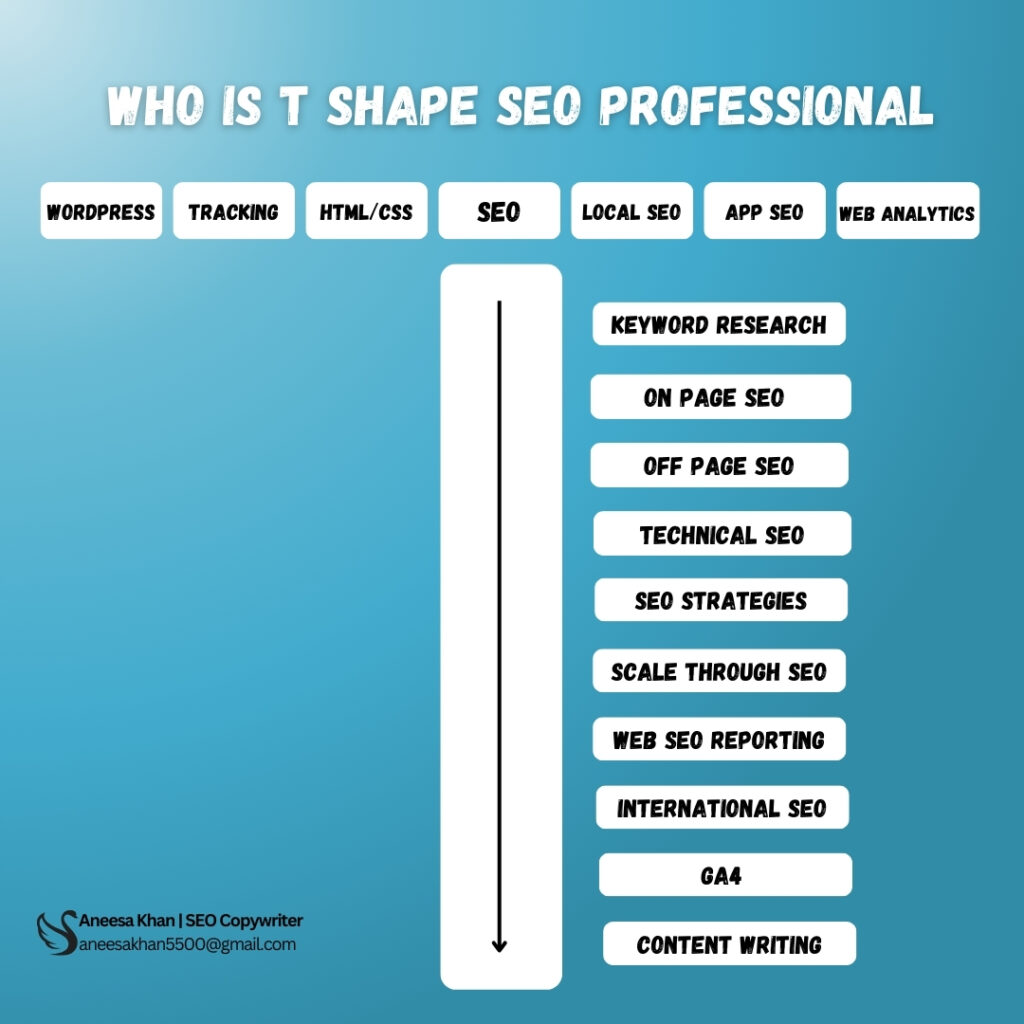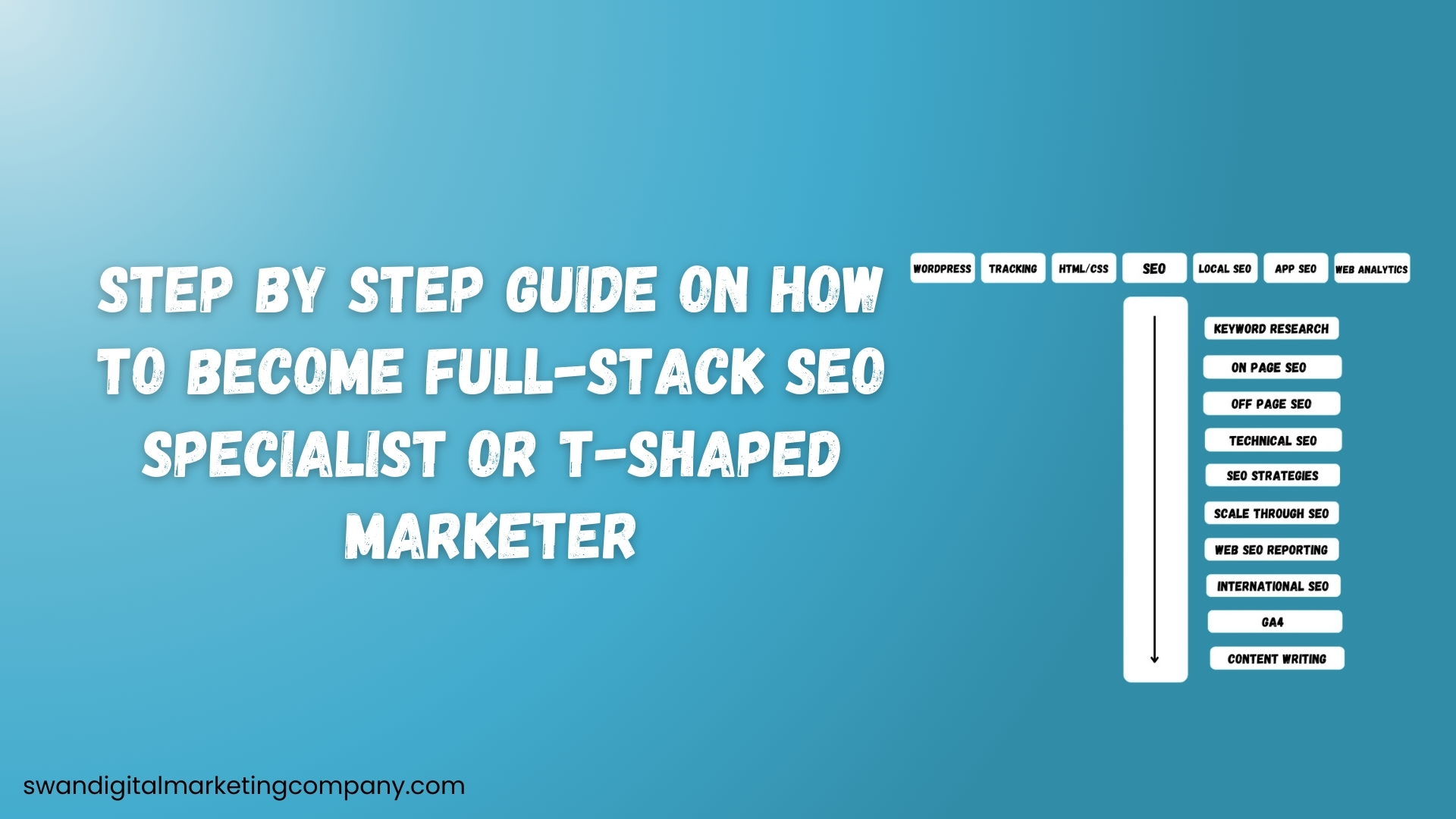SEO is constantly evolving, and to stay ahead, you need to master multiple disciplines. Becoming a full-stack SEO specialist means going beyond just keyword optimization. You need to understand technical SEO, on-page and off-page SEO, analytics, content marketing, and more. However, focusing only on SEO might limit your growth. That’s where the T-shaped marketer concept comes in.
A T-shaped marketer is someone who has deep expertise in one core area (SEO) while gaining complementary knowledge in related fields like WordPress, tracking, HTML/CSS, local SEO, and web analytics. This allows you to execute SEO strategies more effectively and provide more value to businesses. In this guide, you’ll learn everything you need to become a full-stack SEO specialist and a T-shaped marketer step by step.
What is a T-Shaped Marketer in SEO?

A T-shaped marketer has:
- Deep expertise in SEO (vertical line of the T) – This includes keyword research, on-page and off-page SEO, technical SEO, strategy, reporting, and international SEO.
- Broad knowledge in complementary skills (horizontal line of the T) – Skills like WordPress, HTML/CSS, web analytics, local SEO, social media marketing, and tracking enhance your ability to execute SEO campaigns effectively.
Why is Being a Full-Stack SEO Specialist Important?
- Higher demand in the job market – SEO specialists with diverse skills can handle more responsibilities.
- Better collaboration – You can easily communicate with developers, content teams, and marketing strategists.
- Increased earning potential – A full-stack SEO specialist salary is often higher due to their broad expertise.
- Flexibility in career paths – You can work in SEO specialist remote jobs, freelance SEO, or agency roles.
Step-by-Step Guide to Becoming a Full-Stack SEO Specialist
1. Mastering Core SEO Skills (Vertical Line of the T)
To become an expert, you need to have in-depth knowledge of the following SEO areas:
Keyword Research
- Learn to use tools like Ahrefs, SEMrush, and Google Keyword Planner.
- Conduct competitor analysis to find high-ranking opportunities.
- Master keyword clustering and intent-based targeting.
On-Page SEO
- Optimize meta titles, descriptions, headings, and URL structures.
- Use schema markup and structured data for rich snippets.
- Work with WordPress and SEO plugins like Rank Math and Yoast.
- Explain on-page SEO implementation to developers.
Off-Page SEO
- Master link-building strategies such as guest blogging, HARO, and digital PR.
- Learn how to improve content marketing as an SEO specialist.
- Stay updated with best strategies in 2025 for white-hat link building.
Technical SEO
- Use tools like Screaming Frog, Sitebulb, and Google Search Console.
- Perform SEO audits for indexing, crawlability, and site speed.
- Understand structured data and schema for SEO specialists.
- Optimize for app SEO and local SEO.
SEO Strategy & Analytics
- Create a realistic SEO roadmap based on business goals.
- Scale traffic with proven strategies.
- Use Google Analytics 4 (GA4) for tracking user behavior.
- Learn how to interpret SEO metrics like impressions, CTR, and conversions.
International SEO
- Implement right strategies to rank sites in multiple countries.
- Use hreflang tags and geo-targeting for multilingual websites.
2. Learning Complementary Skills (Horizontal Line of the T)
These skills are not mandatory, but they help you become a more effective SEO specialist:
- Web Development Basics (HTML/CSS, JavaScript) – Helps with site structure and SEO-friendly coding.
- WordPress & CMS Management – Essential for content and on-page SEO execution.
- Web Analytics & Tracking – Learn Google Tag Manager and event tracking.
- Social Media Marketing for SEO Specialists – Helps amplify content reach.
- Understanding Google Algorithm Updates – Stay ahead of changes to protect rankings.
Best SEO Tools Every SEO Specialist Should Know
To work efficiently, familiarize yourself with these essential SEO tools:
- Keyword Research & Competitor Analysis: Ahrefs, SEMrush, Ubersuggest
- On-Page Optimization: Surfer SEO, Clearscope, Rank Math
- Technical SEO Auditing: Screaming Frog, Google Search Console, Sitebulb
- Backlink Analysis & Link Building: Moz, Majestic, Hunter.io
- Web Analytics & Reporting: Google Analytics 4, Looker Studio (formerly Data Studio)
Full-Stack SEO Career Paths: Freelance vs. Agency vs. Remote Jobs
Choosing the right path depends on your goals:
- Freelance SEO Specialist – More flexibility but requires client management skills.
- Agency SEO Specialist – Structured environment, good for learning.
- Remote SEO Jobs – Great for work-life balance but requires self-discipline.
Best SEO Certifications for Becoming a Specialist
- Google Analytics Certification
- SEMrush Academy SEO Certification
- Ahrefs Advanced SEO Course
Final Thoughts
Becoming a full-stack SEO specialist and a T-shaped marketer is a game-changer for your career. By mastering deep SEO expertise while expanding into related marketing and technical skills, you’ll be able to create high-impact SEO strategies that drive real business results.
Whether you choose to work in an agency, go freelance, or land a high-paying SEO specialist remote job, this guide has given you the roadmap to success. Now it’s time to start learning, experimenting, and growing!
